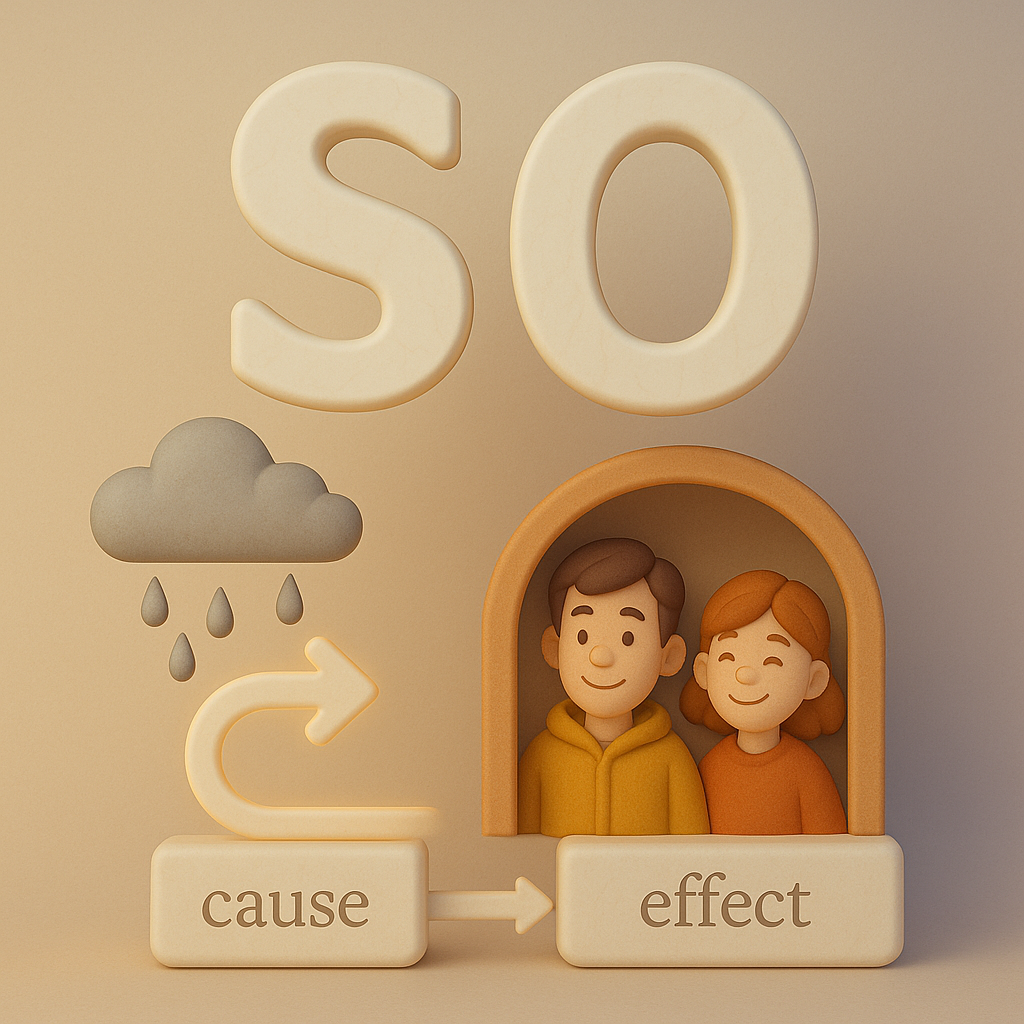So
Definition
The term "so" is used as an adverb, conjunction, or pronoun to indicate a manner, degree, result, or reason.
Parts of Speech
- Adverb
- Conjunction
- Pronoun
Pronunciation
American English
- IPA Pronunciation: /soʊ/
- Respelling: soh
British English
- IPA Pronunciation: /səʊ/
- Respelling: soh
Etymology
The word "so" originates from Old English "swa," meaning "in this way" or "thus." It is related to Old Norse "svá" and German "so," retaining its versatile and broad usage in English.
Derivatives
- Sos (interjection, informal)
- So-so (adjective, meaning average or mediocre)
- Therefore (synonym as a conjunction)
- Insomuch (conjunction)
- Sobeit (archaic conjunction)
Synonyms
- Thus
- Therefore
- Such
Antonyms
- None
Usage
The term "so" has multiple usages depending on its grammatical role. For example, "She was so tired that she fell asleep immediately" (adverb), "I was hungry, so I ate a sandwich" (conjunction), or "If you say so, then it must be true" (pronoun).
Related Terms
- Thus: In this way or as a result.
- Therefore: For that reason or as a result.
- Such: Of the type previously mentioned or under consideration.
Detailed Definitions
Adverb
- To such a great extent: Refers to the degree or manner of an action or state.
- Example: "She was so happy to see her friends."
- In a specific way or manner: Indicates the method or manner of an action.
- Example: "Hold the rope so, and you'll secure the knot."
Conjunction
- To indicate a result or consequence: Used to show the effect of an action.
- Example: "It started raining, so we went inside."
- To express a reason: Used to indicate the cause of an action or statement.
- Example: "I closed the door so the noise wouldn’t bother you."
Pronoun
- To refer to something previously mentioned: Indicates agreement or affirmation.
- Example: "If you say so, then it must be true."
so



🇨🇳 Mandarin
- 所以 (so, therefore)
- IPA: /suɔ̯˥˥ li˥˥/
- Respelling: suǒ yǐ
- 如此 (so, like this)
- IPA: /ʐu˥˩ t͡sʰɨ˥/
- Respelling: rú cǐ
🇮🇳 Hindi
- इसलिए (so, therefore)
- IPA: /ɪs.li.eː/
- Respelling: isliye
- इतना (so, this much)
- IPA: /ɪt̪.naː/
- Respelling: itna
🇪🇸 Spanish
- Así (so, like this)
- IPA: /aˈsi/
- Respelling: a-see
- Entonces (so, therefore)
- IPA: /enˈtonses/
- Respelling: en-ton-ses
🇫🇷 French
- Alors (so, therefore)
- IPA: /aˈlɔʁ/
- Respelling: a-lor
- Tellement (so, to such an extent)
- IPA: /tɛl.mɑ̃/
- Respelling: tel-man
🇸🇦 Modern Standard Arabic
- لذا (so, therefore)
- IPA: /ˈlaðaː/
- Respelling: laða
- هكذا (so, like this)
- IPA: /hakɪˈðaː/
- Respelling: hakida
🇧🇩 Bengali
- সুতরাং (so, therefore)
- IPA: /ʃutorang/
- Respelling: shutorang
- এভাবে (so, like this)
- IPA: /eʋabe/
- Respelling: evabe
🇷🇺 Russian
- Так (so, like this)
- IPA: /tak/
- Respelling: tak
- Значит (so, therefore)
- IPA: /ˈznat͡ɕɪt/
- Respelling: znachit
🇵🇹 Portuguese
- Assim (so, like this)
- IPA: /ɐˈsĩ/
- Respelling: a-sin
- Então (so, therefore)
- IPA: /ẽˈtɐ̃w̃/
- Respelling: en-tawn
🇮🇩 Indonesian
- Jadi (so, therefore)
- IPA: /ˈdʒadi/
- Respelling: ja-di
- Begitu (so, like this)
- IPA: /bəˈgitu/
- Respelling: be-gi-tu
🇩🇪 German
- So (so, like this)
- IPA: /zoː/
- Respelling: zo
- Also (so, therefore)
- IPA: /ˈʔalsoː/
- Respelling: al-so
🇯🇵 Japanese
- だから (so, therefore)
- IPA: /da̠ka̠ɾa̠/
- Respelling: dakara
- そう (so, like this)
- IPA: /soː/
- Respelling: so
🇻🇳 Vietnamese
- Vì thế (so, therefore)
- IPA: /vi˨˩ˀ˨ʔ tʰe˧˥/
- Respelling: vi the
- Như vậy (so, like this)
- IPA: /ɲɜ˧ˀ˦ vəj˧ˀ˦/
- Respelling: nhu vay
🇰🇷 Korean
- 그래서 (so, therefore)
- IPA: /kɯɾɛsʰʌ/
- Respelling: geuraeseo
- 이렇게 (so, like this)
- IPA: /iɾʌkhɛ/
- Respelling: ireohke
🇹🇷 Turkish
- Bu yüzden (so, therefore)
- IPA: /bu jyzdɛn/
- Respelling: bu yuzden
- Böyle (so, like this)
- IPA: /bøjle/
- Respelling: boyle
🇵🇰 Urdu
- لہذا (so, therefore)
- IPA: /lɪhaza/
- Respelling: lihaza
- ایسا (so, like this)
- IPA: /aisa/
- Respelling: aisa





